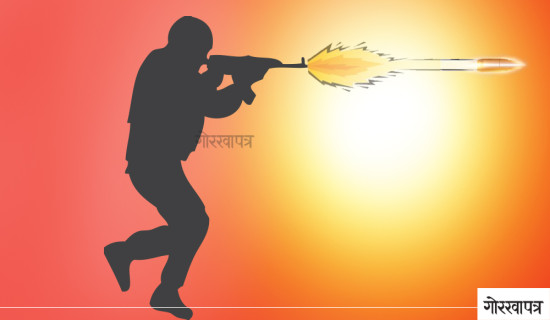- Thursday, 1 January 2026
Share personal documents at your own peril
Kathmandu, Jan. 29: Around two weeks ago, Sagar, a resident of Morang district, saw an advertisement on Facebook. The advertisement was about a job in the World Health Organisation.
He then opened the link and contacted the job provider through the phone number given in the job details and requirements. He was quickly asked to send his documents, including citizenship and passport, to a certain WhatsApp number. Some days later, he was also asked for his bank details, which he provided.
“I received a one-time password (OTP) from my bank two days later. I was surprised regarding the OTP. However, only a few seconds later, I received a call from the job provider who asked me for the OTP. I then scolded him because I understood that I was going to be swindled,” said Sagar.
According to Sagar, the phone call ended as soon as he started scolding.
“I gave the information to the nearby police station. When I went to inquire about the complaint, police said that the number was registered under a fake identity and they were investigating further. Since I wasn’t cheated, I also stopped showing concern towards the complaint afterwards,” he added.
Police officers informed that people’s personal details are vital in the digital age. If someone shares their personal documents with unknown individuals, the documents can be used for several illegal purposes. One such illegal purpose has been for SIM card duplication.
While Sagar was using a phone number registered in his father’s name, the cheaters couldn’t apply for a duplicate SIM using his documents. Thus, they used a different approach to get access to his bank account. Around 10 days ago, the Kathmandu Valley Crime Investigation Office (KVCIO) arrested 26-year-old Purnanath Yogi, a permanent resident of Kalikot district.
Yogi, who was temporarily living in Gangabu, Kathmandu, was arrested for SIM card duplications. According to police, Yogi had created fake posts and advertisements regarding jobs in France and Switzerland at social networking services like Facebook, imo and WhatsApp. When people inquired about the job, Yogi demanded their passport, citizenship and bank details.
“Yogi then misused the documents by using their photocopies to get the SIM card registered under the name of the individual in the document. After this, Yogi accessed the mobile banking service and transferred the money to his other accounts,” read a statement by Nepal Police.
In the second week of January, the KVCIO had also arrested 23-year-old Manam Gharti, a resident of Surkhet living in Ranipati, of Kathmandu. Gharti also created fake job advertisements, requested personal documents, applied for duplicate SIM cards and accessed mobile banking services of others. He was also found sending the OTP of bank-related transactions to his aid Sher Bahadur Chaudhary in Dubai before destroying the duplicate SIM cards.
Police officers informed that the trend has increased recently since people share documents without issue and telecom companies provide SIM cards without strict verification.
According to KVCIO officers, they have requested telecommunication authorities to bring strict and safe procedures to apply and receive a SIM card.
Nevertheless, police requested the public to not share their personal details to others unless required officially and formally.
“When people provide their passports to manpower agencies and middlemen for going abroad, it is wrong. Their document can be used for illegal purposes without their knowing,” said Superintendent of Police (SP) Dan Bahadur Malla of Anti-Human Trafficking Bureau.
Authorities had seized 101 clearance certificates of Nepal Police and 79 passports from two individuals in the Tribhuvan International Airport on Thursday.
The duo had provided a document of the Department of Foreign Employment to the police regarding permission to transport them to Romania for visa stamping purposes.
However, several documents were found to be mismatching during a crosscheck. The duo has been handed over to the Central Investigation Bureau (CIB) for further process.
Similarly, three individuals were arrested on January 18 with 731 passports from two hotels in Gangabu area.
“While hardcopy can be easily misused, a softcopy of the document can also be easily misused because even a photocopy of a citizenship can be a valid document for several services. Thus, personal details should be kept private,” said SP Malla.
















